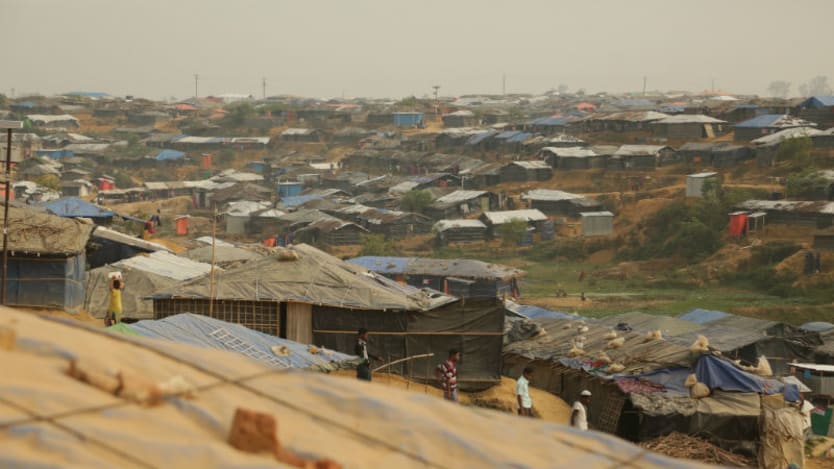
BANGKOK — The arrival of more than 655,000 vulnerable Rohingya refugees to Bangladesh in a four-month span has created a chaotic window of opportunity for those who seek to exploit them.
Small trafficking networks were already targeting the Rohingya minority and members of the local community in Southern Bangladesh ahead of the late August influx of refugees. Now, as aid workers continue to respond to the overwhelming needs of the stateless population, worry grows that once-disorganized trafficking gangs are quickly formalizing.
See more Devex coverage of the Rohingya crisis:
► Aid groups 'desperate' to communicate effectively with 1 million Rohingya refugees
► Opinion: Rohingya women have suffered enough. They don't deserve discriminatory health care.
“In terms of crime, it’s not as organized yet as you’d see in other cities of that size,” Benjamin Steinlechner, UNICEF spokesperson based in Cox’s Bazar, said of the camps that now sprawl across more than 3,000 acres of land. “But we all have to understand that this is a city … you have everything you would find in every other city.”
Forced labor and sexual exploitation have become the most rampant forms of trafficking in the area. Desperate men, women, and children are being recruited with false offers of paid work in industries such as fishing, begging, and domestic work, according to interviews and community focus groups conducted in the district's makeshift settlements by the International Organization for Migration.
Those working in the camps tell Devex there are reports of buses transporting young women every morning from Kutupalong-Balukhali camp to nearby communities for sex work, returning at the end of the day. Other reports include women being enticed to work in the hospitality industry, then being denied wages and becoming trapped in hotels in Cox’s Bazar, or of desperate families selling their children into bonded labor, most commonly in the fish drying industry.
But with no official numbers, the problem remains frustratingly invisible and challenging to mitigate, aid workers say. And because Rohingya society encourages unmarried women and girls — the most vulnerable to sexual exploitation and trafficking — to remain in the home for most of the day, it has taken time to reach them with effective messaging.
To get ahead of the issue, many aid organizations are now encouraging preventative protection measures in the form of discussion and awareness raising in women’s and adolescent groups within the camps.
“The experiences that have forced people to flee their home to live in another country, and the difficulties of day-to-day life in the camps, means people are vulnerable to being misled or taking risks they would not in other situations, and so often need support and additional awareness raising to help them avoid that,” IOM Communications Officer Fiona MacGregor told Devex.
Though there is some level of awareness of trafficking among the community, especially in terms of fear of kidnapping, the promise of income or a better living situation can still override that knowledge.
“For women, what we found was this protection and prevention had to be taken to their homes,” said Iffat Nawaz, head of BRAC’s communication team on the ground.
BRAC, an international development organization based in Bangladesh, has started a program to train young female volunteers to lead their own meetings on the dangers of trafficking and how women in the community can support each other. Someone offering tempting gifts such as gold or fancy clothes, a concrete house, or a new life abroad could be part of a trafficking ring, the women are taught.
The hope is that young women from 12 to their early 20s who have participated in a BRAC-led, 12-session program on protection and signs of trafficking are sharing those messages with their friends and community members.
“That’s been the approach for us, to really create the support inside [the camp], because as you know, we leave at 5 p.m.,” Nawaz said of the enforced curfew for aid workers to exit the camps each night. “It’s been up to the girls to protect each other, and also involve parents and mahzis.”
IOM also runs discussion groups for women and adolescent girls, while community outreach workers offer assistance to any survivors of trafficking they come across during their work in the community. In the meantime, the intergovernmental organization, which leads site management in Cox’s Bazar, is also conducting training sessions with the Bangladesh army and police force to better enforce antitrafficking efforts at checkpoints.
But IOM is also starting to address the issue by offering paid work opportunities to vulnerable women — a new concept for many Rohingya who do not traditionally work outside the home.
A significant number of female-headed households among the refugee community in Bangladesh are no longer able to rely on conventional gender roles to support themselves and their families, MacGregor explained. To address their needs while simultaneously presenting an alternative to other dangerous opportunities on offer, IOM has begun to identify cash for work activities for women — like filling sandbags to help stabilize the hilly, uneven ground where many families are building their shelters.
The opportunity to earn money in exchange for supporting the development of the sites where they are now living “enables them to gain a degree of independence, security and confidence, which can make them less vulnerable to approaches from traffickers,” MacGregor said.
Trafficking in the Rohingya camps “is going to be tackled at many different levels,” MacGregor added. “The more options we can give women so they don’t feel that they have to take risks to get by, and the more work that we can do with authorities to support them in tackling this problem, the better.”
Read more Devex coverage of the Rohingya crisis.
Search for articles
Most Read
- 1
- 2
- 3
- 4
- 5




